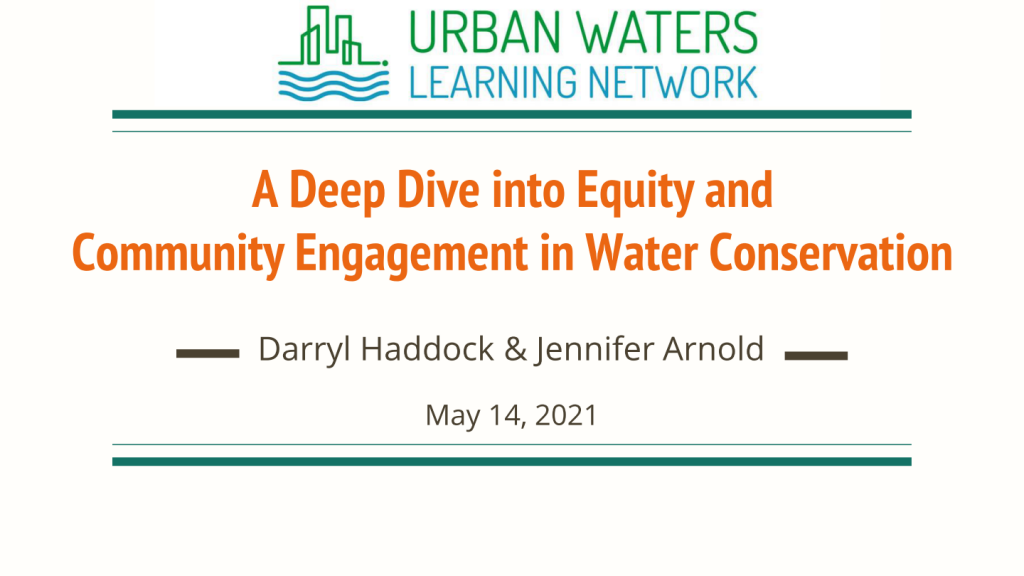In conjunction with River Network’s annual River Rally conference, the Urban Waters Learning Network (UWLN) hosts an Urban Waters Learning Forum, a networking and training event for UWLN members. For the second year in a row, River Rally transformed into a virtual setting for collaboration and connection; and the Learning Forum adapted along with it.
On May 14, 2021, the Friday before Rally’s official start, the UWLN welcomed back Darryl Haddock (West Atlanta Watershed Alliance) and Jennifer Arnold (Reciprocity Consulting) to lead a group of Urban Waters Federal Partnership Ambassadors and their partners in deep conversations about equity in water conservation.
See past sessions hosted by Jennifer and Darryl: 2019 and 2020.
The 2021 session—A Deep Dive into Equity and Community Engagement in Water Conservation—in many ways built upon previous years’ sessions, specifically focusing on the critical connections between urban waters conservation and equity. The federal partnership program specifically intends to create cleaner, healthier, and greener spaces in underserved communities. Incorporating equity, not only as an outcome but also as the process, is of the utmost importance.
One of the key messages from the session is the importance of focusing explicitly on race—the strongest predictor of access to water infrastructure and flooding resilience (Dig Deep & US Water Alliance, 2019; Center for Neighborhood Technology, 2020). Without an anti-racist frame that recognizes and challenges the structures and systems that continue to perpetuate inequities by race, work to improve the environment and economic status of disadvantaged communities often leads to increased disparities.
An equitable process goes far beyond the type of thinking that sets up an ‘us’ and ‘them’ narrative:
“How can ‘we’ get more People of Color in ‘our’ workforce or on ‘our’ board?”
This is the dominant white frame that also creates the types of meetings that feel familiar and comfortable to the dominant culture but not to the culture of many Black, Indigenous, and People of Color. Understanding and re-framing the power structures that exist today are essential to change.
“It’s a long game…but change does come.” ~Darryl Haddock
During the session, participants were given an opportunity to delve more deeply into a diverse set of individual perspectives through a role-play activity. The role-play simulated a community planning meeting to launch a green infrastructure project, which is attended by an advisory committee chair, a government planner, a local funder, a community organizer, and a community member. In the scenario, the green infrastructure project is ready to be launched when it emerges that the community had never heard of it and had not provided any input until this meeting.
Each small group approached the role-play in different ways and arrived at different outcomes. Some completely adapted the project plans to take into consideration the community input, while others were more rigid in maintaining the current power structures. Independent of the approach, the exercise provided vital insights.
- “When you have a voice, it feels awesome. When you feel heard and knowing it was taken into consideration is what matters.”
- “If you have a community group of experts up front, you’re going to save a lot of money…and [you] can save a lot of awkward meetings like the role play if you have the community engagement up front.”
- “[It is] so important to have community engagement at every stage…Asking questions is a great way to encourage conversation and make connection rather than making statements.”
- “Having the funder in the room was a big lesson. It became an opportunity to get to the truth.”
- “I think this exposed a structural problem with the inflexibility in many grant and permitting processes.”
Before ending the session, each Urban Waters Federal Partnership location had a chance to discuss ways to implement new practices into the work that they are doing in their city.
Share the resources from this session with your networks – and look for more learning opportunities from the UWLN as we continue to learn and grow together!


